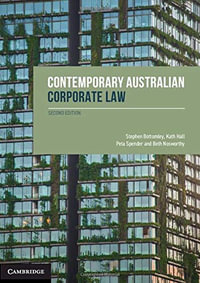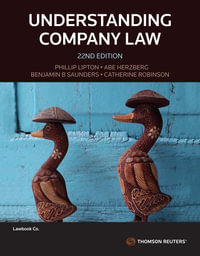Corporate Reorganization Law and Forces of Change argues that significant shifts in logics, practices, and identities in the finance and non-financial corporate fields can change the nature of the problem which corporate reorganization law is required to solve, so that corporate reorganization law is mobilized and adapted by the participants in the process in new and diverse ways. This book argues that, whichever theoretical or policy approach is engaged,
these adaptations cannot all be evaluated using a single universal or fixed conceptual framework. Adopting a comparative US/UK approach, the book undertakes a detailed analysis of six
forces of change which developed in the finance and non-financial corporate fields from the 1980s. It analyses the ways in which these forces of change affected the nature of the corporate reorganization case, and the new ways in which participants in the corporate reorganization process mobilized and adapted corporate reorganization law in response. It argues that it is crucial to analyse the specific adaptations of corporate reorganization law which emerged from this process of change.
This demands that corporate reorganization law theorists or policy makers do not start their analysis using a conceptual framework developed in response to historical adaptations of corporate
reorganization law. It is necessary, instead, to identify how dominant theoretical or policy concerns manifest themselves in the specific adaptation of corporate reorganization law which is under review and to adapt conceptual frameworks accordingly. This is a timely analysis. Just as the book is going to press, governments around the world have been forced to enact shut down measures to contain the Covid-19 threat. The book draws a distinction between adaptations of
corporate reorganization law to reorganize complex, leveraged capital structures and other adaptations to reorganize a mixture of financial and other liabilities. It unpacks why it is necessary to
adapt conceptual frameworks in different ways for these different types of case. This provides a way for scholars, practitioners, judges, and the legislature to think about corporate reorganization law when it is mobilized and adapted to meet the specific challenges posed for business by the Covid-19 shutdown.
Industry Reviews
Corporate Reorganization Law and Forces of Change is an excellent addition to the literature on insolvency and corporate restructuring law. * Alisdair MacPherson, University of Aberdeen, The Edinburgh Law Review *
Corporate Reorganization Law and Forces of Change provides a novel, fresh approach to the study of corporate reorganisation law. * Eugenio Vaccari, International Company and Commercial Law Review *
This engaging and interdisciplinary study by Sarah Paterson offers an examination of how creditors in the UK and US have mobilised and adapted the law in a variety of ways to achieve restructurings ... Readers will gain understanding of two complex systems in a well-written text that should be of interest even to non-specialist readers. * Professor Rebecca Parry, Nottingham Law School, Eurofenix *
Paterson's excellent new book cleverly combines examination of law and finance and demonstrates how the law is mobilized and adapted in the US and UK to suit the case at hand in various ways in the corporate reorganisation context... The book is important because of changes in the financial field that have had significant impacts on large corporate restructuring cases in recent years, namely a shift from "a hold-to maturity, working capital debt market to a traded, leveraged market"... The book builds upon and expands [Paterson's] previous work and in doing so it makes an excellent contribution to literature on the topic of corporate reorganisations... The book takes an Anglo-American approach and offers considerable enlightenment in regard to both systems. It draws upon an extensive range of interdisciplinary literature and has an excellent account of relevant statutes and cases, as well as industry publications and approaches. * Rebecca Parry, International Insolvency Review *
























